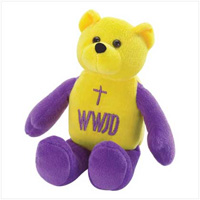 Earlier this month, the nice folks over at The Washington Post's Outlook section asked me to write an essay about what I thought the worst religious idea of the past decade was. I ended up giving them two essays, as I couldn't quite decide which I thought was "worse."
Earlier this month, the nice folks over at The Washington Post's Outlook section asked me to write an essay about what I thought the worst religious idea of the past decade was. I ended up giving them two essays, as I couldn't quite decide which I thought was "worse."
They chose my essay on the so-called Prosperity Gospel. (You can read that one HERE.) I thought I'd share my other essay with you in this space. My other vote for worst religious idea of the decade?
WWJD (aka Using Jesus as a Marketing Tool)
What would Jesus do?
Probably not what we would do.
That's because we're not Jesus. And, frankly, that's the point of Christianity last time I checked.
Jesus was God come to Earth to redeem it and us. He was, the Bible says, perfect. Sinless. Holy. He always made loving choices. He always did the right thing. He always had the right answer.
More often than not, we don't do the right thing or have the right answer because we're imperfect, driven by our appetites and desires; selfish and wounded.
The answers we give to the WWJD question say much more about us than they do about the Son of God. We project our ideas about the world and stamp them with a four-letter divine imprimatur.
I'm pretty sure Jesus wouldn't relish having his message reduced to a bumper sticker, or worse -- a marketing scheme to sell rubber bracelets, trucker hats, or sweatshop-produced cotton-blend t-shirts.
The WWJD movement turns the gospel into a slogan and makes Christianity a brand rather than a radical idea that can change the world.
The word "Christian" was meant to be a noun, not an adjective.
There is no such thing as "Christian rock music," or a "Christian novel," or a "Christian retail."
My friend Rob Bell, pastor of Mars Hill Church in Michigan and author of the book Velvet Elvis: Repainting the Christian Faith, puts it this way:
The problem with turning the noun into an adjective and then tacking it onto words is that it can create categories that limit the truth. Something can be labeled Christian and not be true or good.
WWJD turns a noun into an adjective and then makes it into a label that can be applied to anything and everything, reflecting nothing about what Jesus actually said or did.
We don't know what Jesus would drive, or who he would bomb, or how he would vote. We don't know whether he'd be a vegetarian, a libertarian, or a Luddite. We don't know whether Jesus would listen to rock music, watch HBO, or prefer a Mac to a PC.
What would Jesus do?
The prophet Micah from Hebrew scripture had the best answer I know of when he said, "This and only this is what the Lord God asks of you: to act justly, to love tenderly, and to walk humbly with your God."
But that's hard to fit onto a refrigerator magnet.
The better question is "What did Jesus tell us to do?"
For that we have answers:
Love unconditionally.
Judge not.
Feed the hungry.
Clothe the naked.
Visit the prisoners in jail.
Take care of the poor, the orphaned, the widowed.
Do unto others as you would have them do unto you.
 Cathleen Falsani is the author of the new book The Dude Abides: The Gospel According to the Coen Brothers
Cathleen Falsani is the author of the new book The Dude Abides: The Gospel According to the Coen Brothers. She blogs at The Dude Abides.
Got something to say about what you're reading? We value your feedback!